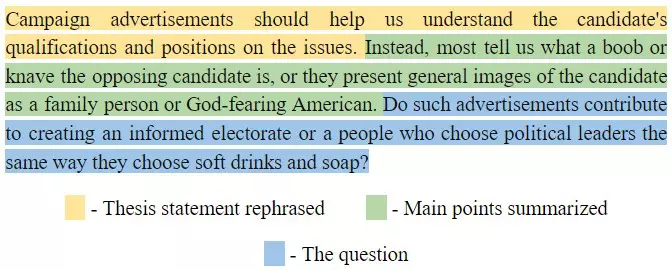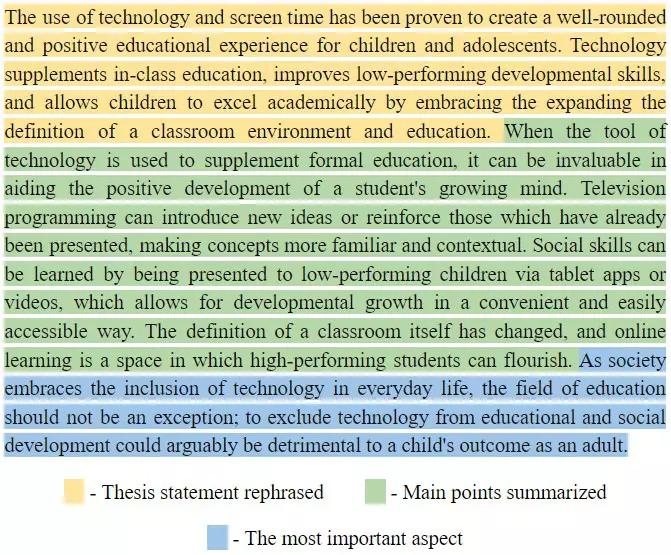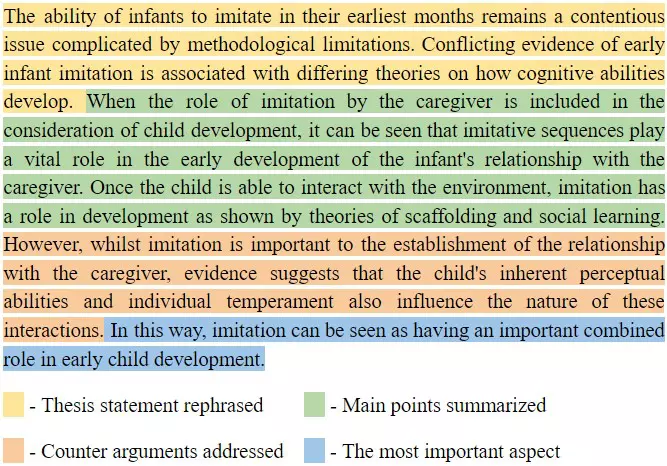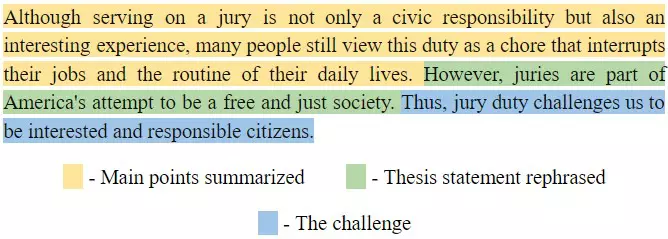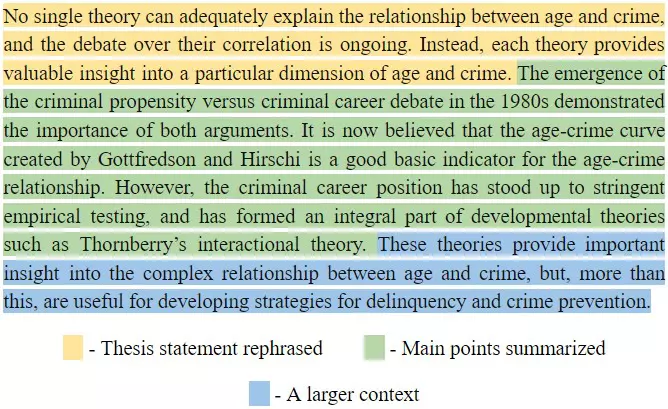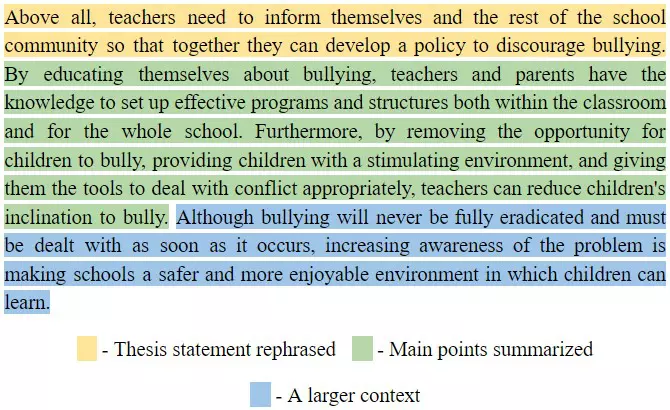A proper introduction is critical to winning the reader’s attention. However, the way you conclude an essay is crucial, too. A compelling conclusion paragraph strengthens your argument and avoids confusion, making it just as important as an effective introduction for a successful paper. When you get to the end of your writing, you get one last chance to convince your audience and produce an impression that will make the reader think about your paper even after finishing it.
“OK, but how exactly should I write a conclusion for my essay?” The answer is, “It depends.”
There are various essay types and many ways in which you can approach your closing paragraph. However, there’s one common thing — your conclusion should provide the reader with a sense of closure and completeness. Believe it or not, you can do that without dismissing the discussion entirely. Below, we’ll tell you about the most common ways you can end a paper, and we’ll show you a few examples of conclusions to illustrate our point.
How Do I End an Essay Then?
You won’t get a good evaluation by summarizing your essay body paragraphs at a high school or university level. Although it’s sometimes seen as a summary of your main points, it’s much more than that. Do you know what the serial position effect is? Essentially, it implies that we remember the first and the last items from a list better than those in the middle. The theory of primacy and recency provides a similar statement: our brain pays the second closest attention to the last thing it perceives. So, your final paragraph will stick in your reader’s memory, along with the first one. It’s the best place to bring out the importance of your topic, the strength of your arguments, and the broader implications of your discussion.
To write a conclusion and end an essay, you should:
- Rephrase your thesis statement and central points;
- (Optional) Refer to opposite views;
- Use one of the techniques below for your closing sentence.
Note: You can go from more specific details to a broader context when writing your conclusion.
How do I paraphrase my thesis statement?
Paraphrasing means using different words to say the same thing. Look at the samples below to learn how you can do it, or read our separate guide on paraphrasing.
Original:
The use of technology and screen tune can be positive for children as it allows them to excel academically by experiencing the expanding definitions of classrooms and literacy as a whole, improving low-performing developmental skills, and supplementing in-class education for more academically-advanced students.
Paraphrased:
By using technology and screen time, you can provide a comprehensive and positive educational experience for children and adolescents. Technology facilitates in-class learning, enhances underperforming developmental skills, and allows children to succeed in their studies by embracing the broadening definition of a classroom environment and overall education.
So, what should the conclusion paragraph include?
Start your conclusion with a rephrased thesis statement. It’s a great way to take the reader back to the heart of your essay. Then, summarize the main points from your body paragraphs. If there are no other standpoints to review, move to step three, which is further detailed in this article. If you are not good at paraphrasing, then you can paraphrase your thesis statement online by using AI tools.
Also, you can put your restated thesis at the very beginning or later. You can start with an opening sentence first, for instance. The one rule you must remember is that it is a bad practice to repeat your thesis statement letter by letter. An effective conclusion paragraph is crucial as it ties everything together, considers broader implications, and leaves a lasting impression on the reader.
Note: Synthesize the main points of your essay. That means you don’t just list them one after another but explain their impact and how they are correlated.
You can experiment with placing these parts so there isn’t a fixed order for them to follow.
Next, provide some additional context for the reader. It’s the third and the last point on our list. You can choose from several options: underscore the weight of your argument, ask more questions, encourage action, compare, or quote someone authoritative in your field. Many strategies exist, but what you pick depends mainly on your topic.
A strong essay conclusion goes beyond recapping. Now, let’s dive deeper and explore how to finish your paper and what you shouldn’t do.
The eight closing methods for your essay
Depending on what you’re writing, the way you wrap it up can vary. It can tie up loose ends, ask a rhetorical question, call to action, or suggest the implications of the topic. Anyhow, we advise you to consult with your tutor or professor when you don’t know whether you can use a particular technique to develop good concluding sentences for essays.
1. Consider a broader scope
Set the discussion into a wider context. By casting a different light on the main topic, you can help the reader take a fresh look at it and reassess their viewpoint.
2. Debate the ambiguity
Tell the audience why there can’t be one exhaustive answer. Often, you can’t say that something is good or bad because you’re in this gray zone of discourse. If you think your topic is that subject, you can write about it in your final paragraph.
3. Ask other questions
Highlight the key questions that arise from your essay and deserve further exploration in future studies. This approach can encourage readers to reflect long after they finish your piece. Additionally, using a rhetorical question can effectively conclude your paper while keeping the conversation open.
4. Try to predict
You’re not a prophet (or are you?), but you can assume the implications for the subject under discussion using logic and deduction. Ask yourself, “How will this affect the world? How will things develop if no measures are taken?” You can apply this way of closing your essay if you’re writing about a problem and its possible solutions or observing a phenomenon.
5. Challenge or call to action
This approach is often used to wrap up persuasive speeches and inspire action. If your essay highlights an important issue and suggests ways to address it, consider concluding with a call to action for your audience.
6. Echo the introduction
It’s a subtle way to wrap up the paper in case you want to close the circle and use the same scenario you used at the beginning. But don’t forget to rephrase it! This one is best for a personal or a narrative essay. You can also refer to an idiom or a quote you used in the introduction to loop your paper.
7. Conclude with a quote
A great way to conclude your essay is by including a quote. Just make sure it’s from a credible source, relevant to your topic, and aligns well with the overall message.
Note: Learn more about citing sources in your essay by reading this article: How to Cite an Article in an Essay.
8. Indicate the most important point
In case you plan to show the final verdict you have arrived at, you can highlight it in your last sentence. This will work if you can extract one big conclusion from everything you wrote without weakening the main argument.
How NOT to end an essay
In addition to sharing what to include in your essay’s conclusion, we’ve also put together a list of common pitfalls to avoid. While wrapping up your paper can be challenging, it’s definitely achievable. After putting in so much hard work, it’s understandable to want to rush the ending. However, it’s important to resist that temptation and keep these conclusion tips in mind.
In your conclusion paragraph, DON’T:
- Present any new arguments, proof, and details
- Make things look too simple
- Use meaningless cliches that only sound nice
- Belittle your abilities and make excuses
- Summarize the essay, esp. if it’s a small one
- Make your argument look weak
- Rephrase thesis statement without anything else
- Create a list-like ending that’s repetitive
- Put emphasis on a weaker argument
- Use transition words like “to sum up” or “in summary”
Can’t I just summarize an essay at the end?
Technically, you can. But it’s a bad practice to end just with a recap of the essay, so ensure to add other parts as well. If you don’t want your work evaluated as middle-school-level writing, go beyond rehashing the content.
Why can’t I add new information?
You’ll only confuse the reader if you introduce new arguments and ideas at the end. The person evaluating your essay will probably think you can’t organize your thoughts well, resulting in a reduced grade. An effective argumentative essay conclusion should avoid introducing new arguments and ideas at the end.
You are on the right track if nothing from the list above is in your closing paragraph.
Essay conclusion paragraph examples
Below, you’ll find a selection of conclusion samples chosen from trustworthy sources to help you craft your own. You’ll notice that the length and style differ based on the topic, type of paper, and the author’s perspective. If you have a conclusion example that meets our guidelines, feel free to share it using the “Helpful” form below. If it meets our standards, we’ll include it here.
For instance, an expository essay conclusion might discuss the significance of the bandwagon effect in psychology and emphasize the importance of critical thinking and individual autonomy in countering its influence. This type of conclusion highlights the implications of the bandwagon effect and the need for independent thought and decision-making.
Mini-FAQ
An essay’s conclusion is your last paragraph, the last section where you combine all the puzzle pieces to create a complete picture composed of your rephrased thesis statement, reviewed and synthesized evidence, and a sentence that would expose your topic in a broader context.
You can begin by paraphrasing your thesis statement to remind the reader (who’s generally your professor) about the essay’s main subject.
You can reemphasize your main conclusion or try other methods like asking a question that derives from your findings, encouraging the reader to take action, citing a quote from a subject matter expert, or assuming how things will develop in the future.
Only a powerful conclusion can leave a strong impression on the audience. You can achieve that by drawing on human emotions like fear, awe, anxiety, confusion, disgust, interest, nostalgia, or sympathy.
You can just state it. You don’t have to use any special phrases, and just start concluding. The better variants of phrases you can use instead of “in conclusion” are in the final analysis, on the whole, on a final note, given all the factors we have discussed.
The list of references
- Ending the Essay — Harvard College Writing Center
- Writing Effective Endings — University of Richmond Writing Center
- Concluding an Essay — Purdue Online Writing Lab
- Finishing a Paper — The University of Maryland
- Conclusion Writing — Monash University


